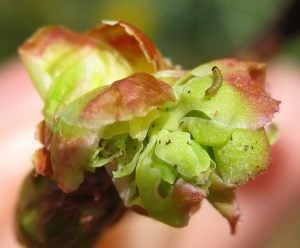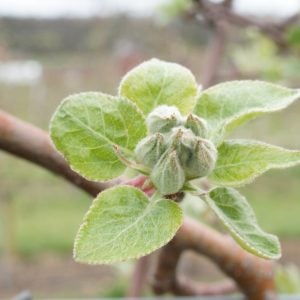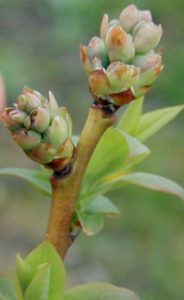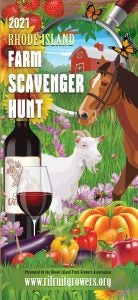April 22 winter moth update
Happy Earth Day! Cold, windy, and a few snowflakes – Mother Nature’s joke for the day.
Winter moth eggs finished hatching last week. Now, and for the next week or so, is a good time to check your apple and blueberry buds for winter moth caterpillars. I’ve looked at a few blueberry plantings in RI and have found more winter moth caterpillars than I would like to see in 2 out of 4 plantings. In two blueberry plots, more than half of the blueberry flower buds had one or more winter moth caterpillars or evidence of caterpillar feeding (frass). The caterpillars are still very small and can be difficult to see. It will be easier to find caterpillars next week when they are larger and have caused more visible damage inside of buds. You will need to pry open buds to find damage or caterpillars. Apple buds are easier to pry open to check for caterpillars. It’s very helpful to use a magnifying glass to see caterpillars or frass.
Fig 1. Winter moth caterpillar found inside a blueberry bud once the bud was pried open. Caterpillar frass is also visible and often easier to find than a caterpillar.
We don’t have a really good threshold to indicate whether or not to spray apples, pears, or blueberries for winter moth caterpillars. Some Nova Scotian guides recommend spraying apple trees when 1-2 caterpillars are found in 20 buds (>5% infested buds).
A good time to spray for winter moths is from tight cluster to bud separation–when the flower buds start separating from the cluster, but before blossoms open. So right now is a good time to check buds. If you find more than 5% of buds with caterpillars or frass you may want to apply an insecticide.
All common insecticides labeled for apples and blueberries control winter moth caterpillars well. Bt insecticides (such as Dipel) are also effective. Bt insecticides kill only caterpillars, so don’t harm bees and other insects.
Fig 2 & 3. Tight cluster bud stage of apples and blueberries is the time to look for winter moth caterpillars. Blueberry buds are more difficult to check than apple buds.
The URI Plant Clinic has moved into the Skogley Turf Research Center, but you can still drop off or mail samples to 3 East Alumni Avenue, Kingston, RI 02881. There is a $10.00 charge for landscapers and plant owners.
And you may be interested in the RI Farm Scavenger Hunt! It starts May 1st and continues throughout 2021. Brochures can be picked up at one of the open farms participating in the scavenger hunt. You can see the brochure at the RI Fruit Grower’s website http://rifruitgrowers.org/
If you are interested in helping to distribute brochures around RI please contact me at hhf@uri.edu.
 Home
Home Browse
Browse Close
Close Events
Events Maps
Maps Email
Email Brightspace
Brightspace eCampus
eCampus






